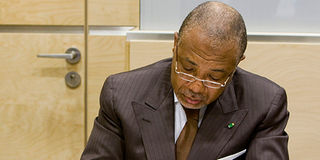Taylor admits allowing display of human skulls

Former Liberian President Charles Taylor sits in the courtroom of the International Criminal Court (ICC) prior to the beginning of his defence PHOTO/ FILE
THE HAGUE, Thursday
Liberian ex-president Charles Taylor told a war crimes court today he had seen nothing wrong with human skulls being displayed at checkpoints in Liberia during his 1989-90 “revolution.”
“Skulls were used as symbols of death,” he told judges of the Special Court for Sierra Leone trying him on 11 counts of war crimes and crimes against humanity stemming from the 1991-2001 civil war in neighbouring Sierra Leone.
“These were not our people. Enemy soldiers had been killed and their skulls were used. I knew that, and it did not bother me.”
The skulls were of soldiers killed in clashes with Taylor’s National Patriotic Front of Liberia (NPFL) which invaded Liberia from the Ivory Coast in 1989 to oust his predecessor, president Samuel Doe.
Mr Taylor sought to draw a distinction between human skulls and fleshed human heads, calling it “a blatant, diabolical lie that I, Charles Ghankay Taylor or anyone would drive by a human head.
“These were only skulls that I saw and I would not have tolerated anyone killing and putting a human head up,” he told the court.
The 61-year-old testified that skulls were displayed as a symbol “that death had occurred by the enemy” and to convey the message that “if you do wrong, this is the result.”
Mr Taylor argued that the skull was still used as a symbol by “western fraternal organisations”.
“I saw them (at the checkpoints), I investigated... and came to the conclusion it was not anything wrong.
“I had also seen skulls in fraternal organisations that are western, I did not think there was anything wrong with a skull. “We are not taking about skulls lying around all over the place”, he added, but only “at certain strategic junctions.”
Mr Taylor denied, however, having ordered the setting up of skulls at checkpoints. The former warlord took the witness stand on Tuesday for the first time since his trial started in January 2008, dismissing as “lies” the charges of murder, rape, conscripting child soldiers, enslavement and pillaging against him.
The invasion of Liberia and his ascent to power was a prelude to Taylor’s involvement in the brutal 1991-2002 civil war in neighbouring Sierra Leone, for which he is accused of 11 counts of war crimes and crimes against humanity.
He has pleaded not guilty to all charges at the Special Court for Sierra Leone.
Taylor is not on trial for offenses in Liberia, but his testimony appeared aimed at allegations at the heart of the prosecution case that rebels backed by Taylor in Sierra Leone used terror tactics, including systematic amputations to intimidate the population. Mr Taylor has dismissed those allegations as lies and rumours.
He used his third day on the witness stand to directly deal with some of the most grisly prosecution evidence — that his fighters in Liberia strung human entrails across roadblocks and displayed human heads on poles to strike fear into the local civilians and soldiers of the Liberian army.
He dismissed as “nonsense” the allegation that his troops disemboweled their enemies and tied their intestines across roads.
One of his former commanders who testified for the prosecution, Joseph “Zigzag” Marzah, said Mr Taylor drove past such scenes. Taylor said that was “a blatant, diabolical lie.”
He conceded atrocities were committed in Liberia, but said he had trained his small band of rebels — from their initial training in Libya — to abide by the laws of war. “We found out that they were taking place and we acted to bring those responsible to justice,” he said. Rebel soldiers who committed excesses were court-marshaled and sometimes executed, but civilian judicial institutions were left in place in areas under rebel control.
Mr Taylor told the three-judge panel that for his 168-strong force to seize power in Liberia it would need the support of the local population.
“There would be no excesses,” he said.
Mr Taylor is the first defense witness in the trial, which opened in January 2008, following 91 prosecution witnesses who claimed Mr Taylor commanded Sierra Leone rebels from the presidential mansion in Liberia. The rebels’ signature crimes were amputations, rape and the conscription of child soldiers and enslavement of women.
In his first three days, Mr Taylor sketched a turbulent African continent in the 1980s that was the backdrop for American anti-communist efforts and African freedom fighters backed by Libyan leader Muammar Gaddafi struggling to shake off “the yoke of colonialism.”
Taylor is expected to testify for several weeks before the prosecution begins its cross-examination. (Agencies)




